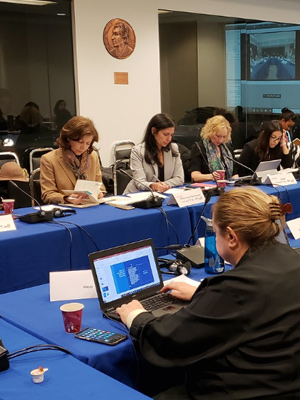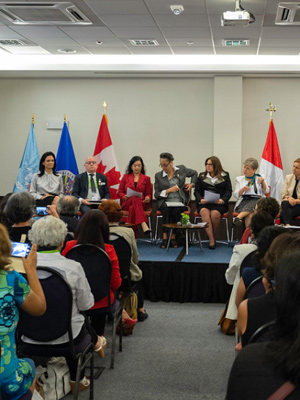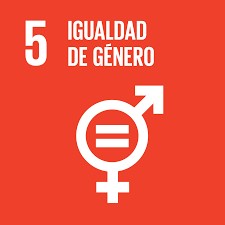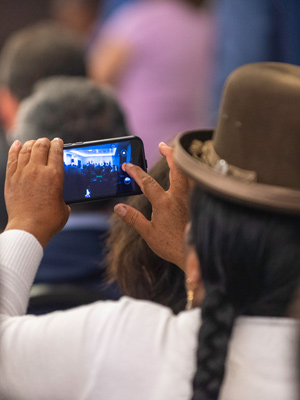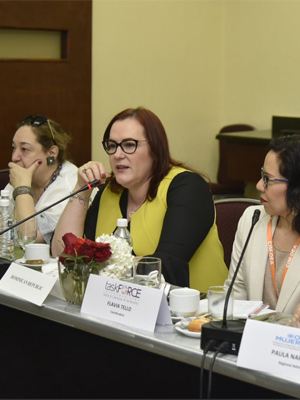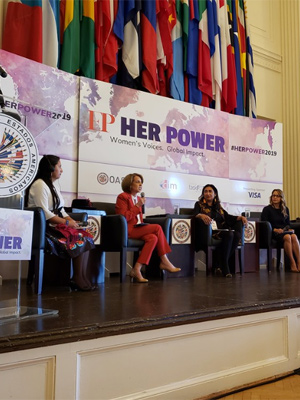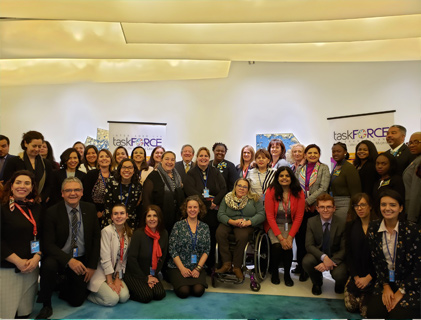- English
- Español
The INTER-AMERICAN AWARD FOR GOOD PRACTICES IN WOMEN’S LEADERSHIP is an inter-institutional initiative of the Inter-American Task Force on Women's Leadership. The participating institutions include the Inter-American Commission of Women (CIM), the Inter-American Commission on Human Rights (IACHR), the Pan American Health Organization (PAHO), the Ibero-American General Secretariat (SEGIB), ParlAmericas, and International IDEA, together with two civil society organizations: the Caribbean Institute for Women in Leadership (CIWiL) and the Latin American and Caribbean Committee for Defense of Women's Rights (CLADEM). This initiative is supported by the Government of Canada, as well as the Summit of the Americas Secretariat (SAS) and Department for Effective Public Management (DGPE) of the Organization of American States (OAS).
This call seeks to recognize, highlight and amplify public policies as well as initiatives from the private sector and civil society that promote an increase in the number of women in leadership positions and/or strengthen their empowerment and advocacy capacity in decision-making. The ultimate aim is to contribute to closing gaps and inequalities from a rights perspective, valuing the ability to innovate, generate significant impacts, combine synergies, strategic alliances and, above all, consider leadership from a comprehensive, rights-based intersectional perspective, so that no woman is left behind.
2022 Awarded experiences Summary of the participant and awarded experiences- To participate, please read the Bases of the call and pay attention to all of the details and conditions of the call.
- If the nomination is for the Best Practices Award, you will need to complete the application form in its entirety.
- If the nomination is for the Women Leaders of the Year Award, you do not need to complete any forms. Please read the eligibility criteria for this case (available in the Bases).
- Government institutions, public administration at the national or subnational level, as well as private sector companies and civil society organizations, belonging to any country in the Americas and the Caribbean.
- Category 1. Public policies and guarantees for the exercise of women's leadership.
- Category 2. Private initiatives for women's leadership in business.
- Category 3. Civil society initiatives for the empowerment and leadership of girls and women.
This call includes a special recognition to highlight women’s individual leadership, in which the eligibility and evaluation criteria are different. Recognitions for women leaders will be awarded in the following areas:
- Mention: Women’s leadership in the response to the COVID-19 crisis
This recognition aims to highlight women’s leadership in the response to the COVID-19 crisis, including their contributions in mitigating the emergency in the fields of health and scientific research, and also in aspects such as the economy, governance, and social management of the challenges posed.
- Mention: Young women leaders of the year
This recognition aims to make highlight the leadership of young women who contribute with their work and their merits in the scientific, cultural, social and humanitarian fields, linked to progress and social well-being in an extraordinary and exemplary way. In this case, applications may be submitted for young women between 16 and 24 years of age.
- Applications from individuals in a personal capacity will not be accepted.
- Nominations can be made by the initiative's leading institution, or by third parties, provided that all the requirements expressed in these bases are met.
- Project ideas that have not yet been executed will not be accepted.
- Applicant experiences must have been implemented between January 1, 2017 and December 31, 2021, or still be in execution at the end of this term, with verifiable and measurable results achieved to-date.
- The application form must be completed in its entirety.
- The nomination must be supported by at least two reference letters issued by third parties, indicating why this experience is worthy of receiving the award.
- The nomination must include a letter of consent and authorization to disseminate and make use, totally or partially, of the content of the application and the experience described.
- Proposals that refer to ideas or practices that are not respectful of the human rights regulations and framework at the national, regional and international levels will not be accepted.
- If any entity wishes to apply to more than one category, it must do so in different application forms.
- An entity can apply for a maximum of three (3) experiences within the same category.
Considerations:
- Nominations must be proposed and submitted by third parties (natural or legal persons).
- The nomination will be made through a letter that may be accompanied by as many documents, bibliography and audiovisual materials as desired, in order to accredit the merits of the proposed nomination.
- The nomination must be supported by at least two reference letters, issued by third parties.
- The women nominated must be from and reside in one of the countries of the Americas or the Caribbean at the time of nomination.
The selection and prioritization of the nominated initiatives will be evaluated according to different criteria, including aspects such as:
- Demonstrable results: The experience demonstrates results or impacts that have been achieved and are measurable through indicators, evaluation reports, studies, etc. It will be critical to include both quantitative and qualitative indicators, as well as baseline indicators and outcome indicators that measure the changes generated by, and the impact of the initiative.
- Inclusive leadership: Degree to which the leadership of the initiative itself includes the participation of women. The level at which this participation occurs will be evaluated: in the consultation, assessment, decision-making, implementation and/or evaluation phases. Include quantitative indicators of such participation.
- Innovation: Ability to generate innovative proposals that respond creatively to the challenges to women’s leadership in decision-making spaces.
- Intersectionality: Degree to which the initiative incorporates an intersectional gender approach, with special attention to women from historically excluded groups (indigenous, Afro-descendant, rural, persons with disabilities, LGBTIQ+, youth, older persons and migrants).
- Multi-actor alliances: Ability to work in association and/or alliance with different strategic actors for the development of the initiative, be these intra-institutional, inter-institutional, inter-sectoral, or public-private alliances.
- Sustainability: A condition that guarantees that the objectives and positive impacts of the initiative last long after its conclusion. Indicate, for example, if there is a regulation that gives validity over time, the allocation of a budget or alliances that guarantee the sustainability of the initiative.
- Replicability: Capacity, ease and flexibility of the experience, in whole or in part, in terms of its applicability in similar situations, or its potential to inspire other similar initiatives.
- Comprehensiveness of the gender perspective: Initiatives that are framed within a demonstrable organizational policy on women's rights will be valued. One of the ways in which this comprehensiveness can be demonstrated will be the adherence of the institutions to programs such as the Women’s Empowerment Principles (UN Women), the Gender Equality Seal (UNDP) or the Gender Parity Initiative (IDB).
The selection and prioritization of the nominated women leaders will be evaluated according to different criteria, including aspects such as:
- Evidence: Nominations that show evidence of the good work of the nominated women leaders will be valued, whether through their initiatives, programs or projects promoted, as well as their impact on societies.
- Initiative: Degree to which the nominated woman stands out for having been a pioneer or proactive in responding to a question of social concern.
- Inclusive leadership: Degree to which the nominated woman exercises inclusive leadership, favoring the participation and/or attention to others, especially valuing the inclusion of historically excluded groups (indigenous peoples, Afro-descendants, people with disabilities, LGBTIQ+, youth, migrants, etc.).
- Values-based leadership: Nominations will be valued of women whose leadership is based on the human rights approach and, in particular, women's rights, as well as values such as ethics and commitment to causes of social interest.
- Backing: Nominations will be valued that are accompanied by the support and adhesions that are considered appropriate, which may be formalized through letters of support or collection of signatures supporting the nomination.
- The good practices awards will be conferred on the institutions responsible for the nominated initiatives. Individuals, as well as agencies, consultancy firms and external advisors involved in the design and/or implementation of the initiative do not qualify to receive the award. In the case of public-private partnerships, recognition will be conferred on the public body.
- Recognitions for women leaders will be conferred on the nominated individuals.
The Jury will be made up of a committee of representatives of the different organizations that are part of the call.
The Jury may decide to award honourable mentions if it deems that the nominations warrant such recognition. Likewise, the Jury reserves the right to declare any of the award categories void based on its review of the nominations.
An evaluation committee will pre-select nominations in view of the documentation presented, and may require the verification and validation of the evidence, which will be carried out in order to ensure the veracity and consistency of the nominations against what has actually happened in the field.
After this first stage, the pre-selected and verified initiatives and women leaders will be submitted to the Jury, who will determine, unanimously, the final selection based on the above-defined evaluation criteria.
Nominations may be disqualified from the evaluation process for any of the following reasons:
- Failure to observe the bases of this call and the eligibility criteria for the nomination.
- Presentation of false or misleading supporting information or documentation.
- Not contributing to the provision of evidence during the evaluation process, if requested.
- Observance of unethical behavior or exercise of undue pressure during the evaluation process.
- The policies or activities of the nominated institution are not in line with the policies, norms and/or regulations of the member organizations of the Task Force.
The award may be revoked if previous or subsequent events of a character incompatible with the criteria established in this call are observed.
The Award Ceremony will be held during a public international event, to be held in 2022 (date to be determined).
The award, in each of the categories, includes:
- An acknowledgment expressed in a certificate issued by the different organizations that are part of the call. This recognition authorizes the entity to use it for the institutional purposes that have been established as a priority in its communications.
- The dissemination and promotion of the award-winning experience as a good practice with potential for replication through digital publications and events for the exchange of experiences organized by any of the different organizations that are part of the call.
The organizing institutions reserve the right to disseminate the results of the selection process. Likewise, the applicant/awardee must authorize the dissemination and use, in whole or in part, of the content of its application and the experience described, in which case it will become part of a bank of good practices available on the website of the Inter-American Task Force on Women's Leadership.
Launch of the Call for Submissions March 25th, 2021
Deadline for submission April 30th, 2022
Publication of the results May, 2022
Awards Ceremony At a public international event (place and dates to be determined)
* These dates could be subject to change due to force majeure.
- Complete the online form in its entirety.
- Include a letter of interest presenting the nomination, describing the reasons why the nominated initiative may be worthy of the Inter-American Prize.
- At least two letters of reference issued by third parties, indicating why this experience is worthy of receiving the award.
- Applications from individuals in a personal capacity will not be accepted.
- Un-executed projects will not be accepted.
- Nominated experiences must have been implemented between January 1, 2017 and December 31, 2021, or be in execution at the end of this term, with verifiable and measurable results achieved to-date.
Failure to comply with any of these requirements will result in immediate dismissal of the nomination for the good practice awards.

